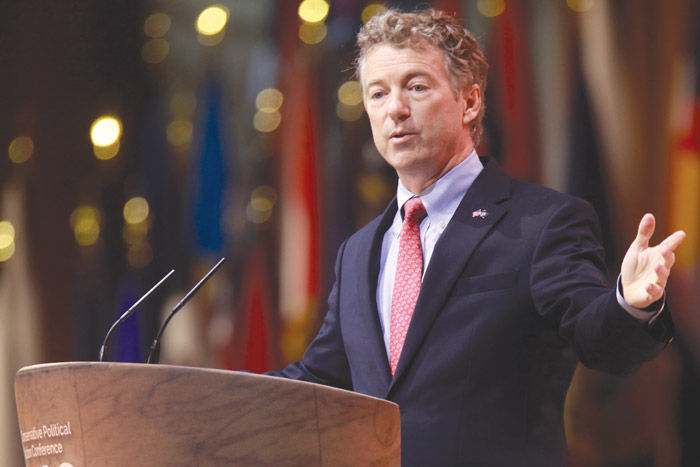After winning only one delegate with 4.5 percent of votes at the Iowa caucus, Rand Paul announced that he would no longer be pursuing the 2016 Presidential Nomination from the Grand Old Party (GOP).
The withdrawal of Rand Paul, the man Time Magazine called “The Most Interesting Man in Politics” in 2014 left many libertarian voters feeling like they have lost the last candidate in the two major parties who really represents them. With his dovish foreign policy, opposition to expanded government surveillance and advocacy for criminal justice reform and drug liberalization, Paul was the only GOP candidate to actively court the libertarian vote.
Despite the fact that there are no other candidates who have his particular combination of socially liberal and fiscally conservative views, there are other candidates who come close to libertarian ideals. Corollaries can be found particularly in the fields of immigration, criminal justice reform and foreign policy.
On immigration policy, Rand Paul favored reform to facilitate legal immigration while also imposing mild penalties on current illegal immigrants.
On July 26, 2015, he said to FOX News, “I think that you do have to have a secure border, but I don’t automatically think that immigrants are bad people. I think the opposite. I think of my great-grandfather, who came here from Germany, and I think that most immigrants come here seeking the American dream. And I’m not going to vilify all immigrants with a broad brush.”
The closest to this position seems to be Marco Rubio. As one of the “Gang of Eight”, the bipartisan group of eight senators who drafted the Border Security, Economic Opportunity and Immigration Modernization Act of 2013, Rubio seems to likewise support securing the borders while making legal immigration easier. In his address to the National Association of Latino Elected and Appointed Officials, Sen. Rubio said, “The people who are against illegal immigration and make that the core of their argument view it only as a law and order issue. But we know it’s much more than that. Yes, it is a law & order issue, but it’s also a human issue. These are real people. These are human beings who have children, and hopes and dreams. These are people that are doing what virtually any of us would do if our children were hungry, if their countries were dangerous, if they had no hope for their future.”
In the area of criminal justice reform, Rand Paul favored comprehensive reform including the removal of military-grade hardware from the hands of local police, the restoration of voting rights to nonviolent felons and a general shift in focus away from the pursuit of nonviolent criminals in favor of more seriously pursuing dangerous and violent criminals. These policies go hand-in-hand with his support of broad reform of drug laws which would place legalization in the hands of the states and end what he terms the “overcriminalization” of drugs like marijuana.
In terms of foreign policy, Rand Paul is one of the most dovish candidates in the primaries. He has consistently opposed the wars in the Middle East as unconstitutional.
Paul said, “I’m not a pacifist, but I do think it unacceptable not to hate war. I’m dismissive of those who champion war as sport and show no reluctance to engage in war. Any leader who shows glee or eagerness for war should not be leading any nation. I believe truly great leaders are reluctant to go to war and try mightily to avoid war.”
Paul has even clashed with his hawkish fellows when he filibustered the nomination of John Brennan as CIA director as a protest against the Obama administration’s use of drone strikes against terrorists.
In these two arenas, there is really only one candidate who compares favorably to Paul. Although the two couldn’t be more different with regards to fiscal policy, Bernie Sanders has advocated focusing on domestic issues. Both senators oppose American exceptionalism and support furthering negotiations with Iran.
Furthermore, both candidates have supported a “treatment over punishment” policy with respect to drug laws and have openly spoken against harsh punishments for nonviolent crimes.
Now that Rand Paul has dropped out of the presidential race, it has become a lot less interesting. Without a libertarian wildcard in the GOP’s deck, the conservative establishment will have far more free reign to modulate the tone of GOP debates. If nothing else, this will hurt the entertainment value of those debates. However, this is not to say that Paul’s policies have left the discourse. They’ve just become a lot harder to find.
Maybe next election, Rand.
Categories:
Where can Libertarians turn?: Alternatives to presidential candidate Rand Paul
David Spearman, Outlook Editor
February 8, 2016
Courtesy of Gage Skidmore//Flickr
Rand Paul, favored by the Libertarian vote, has dropped out of the 2016 Presidential race.
0
Donate to The Tiger
Your donation will support the student journalists of Clemson University. Your contribution will allow us to purchase equipment and cover our annual website hosting costs.
More to Discover









